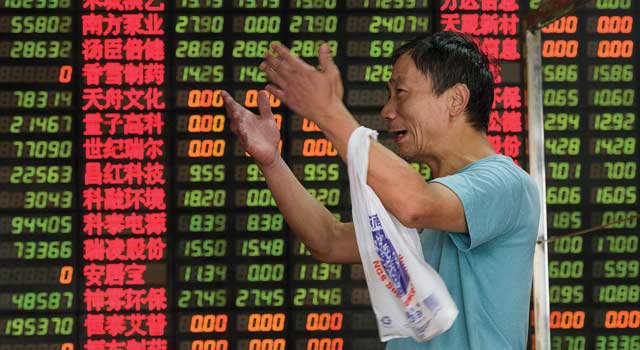In just two months, over US$190 billion has left China in capital outflows to other investment destinations after its market crash. Although difficult to tell where the cash is headed, Gazette Business Reporter Kabo Ditlhakeng finds that there are few attempts by the Botswana Investment community to tap into this capital? Moatlhodi Sebabole, a finance PhD candidate and economist at First National Bank of Botswana (FNBB) shares with us what really transpired in China; He said; “China rebased its economy wanting to shift away from exporting as the major driver of economic growth, preferring rather domestic consumption as the driver.” According to Sebabole, this came with easy access to credit by unsophisticated individual investors to invest in the stock market.
“In the year leading up to the crash, individual investors put in too much money in stocks using borrowed money. They exceeded the rate of economic growth and profits of the companies they were investing in. As a result, investors faced margin calls on their stocks and many were forced to sell off shares en masse, causing the crash,” explained Sebabole.
Quizzed on where the capital is likely to go, Sebabole opined that capital is constantly looking for better returns and that emerging economy markets provided just that. Sebabole was not too upbeat about a large chunk of the capital flowing into the Botswana Stock Exchange (BSE) citing the small size of the local bourse and lack of liquidity. “The Botswana Stock Exchange is small and not ready for the kind of funds we’re talking about here; you just cited $190 billion in capital outflows over two months. We need to do something about the liquidity position of the local stock market, it is dominated by institutional investors who buy and hold stock for long periods,” decried Sebabole.
However, he commended initiatives by stocks like the Exchange Traded Funds (ETFs) where stocks from other markets are sold as a basket, or in some cases are tied to commodities like gold which is performing very well.
ThapeloTsheole, Deputy Chief Executive Officer (CEO) of the BSE corroborated Sebabole stating that, “Though it’s difficult to say, capital in its nature is always looking for better returns. It [the capital] will go to markets which offer better returns and safe havens. Safe havens here being gold and US dollar denominated investments,” responded Tsheole.
On the question of what strategies the BSE is implementing to attract some of the capital windfall, Tsheole responded; “The BSE is attractive as it is, it is the most attractive stock exchange in Sub Saharan Africa.” Further, Tsheole said as a result they have received a lot of enquiries about their investments instruments from global investors, and that they have converted most of these enquiries into sales.
Asked if they have seen a lot of capital inflows from China after the Chinese market crash, Tsheole said it was difficult to tell. “The capital flowing out of China will not flow directly to Botswana. It may first go to investor home countries before flowing here, so it’s difficult to say if, say, an American invests heavily with us, the funds may have been recalled from China,” he said.
Letsebe Sejoe, CEO of the Botswana Investment and Trade Centre (BITC), a parastatal organization tasked with attracting Foreign Direct Investment into Botswana appreciated that capital that is flowing out of China was invested in portfolio investments like equities and bonds.
“Those investors, if they were to invest here would want to put their money in similar equities,” he responded. However, Sejoe was quick to add that as an entity, they are aware that the Chinese are flush with cash and they are within the BITC’s radar of investors to call to Botswana.
“We’re in talks with a number of Chinese investors to invest in ‘greenfield’ type of investments. Our talks are at an advanced stage with one Chinese investor who specializes in township development, others are looking to invest in hospitals, while others will invest in truck stops,” he said.
Tlotlo Ramalepa, an analyst with Motswedi Securities said it was difficult to tell. “It may go to markets with better returns, or stockbrokers may have decided to withdraw it from the Shanghai Stock Market, call it back and hold on to it in cash while they decide where next to invest it,” he said, adding that the Chinese debacle is nothing more than investors taking cautionary measures against slowing growth in the Chinese economy.
Asked if they have seen an influx of capital since the Chinese market crash, Ramalepa said there is a lot of interest by investors in Botswana, “but I can’t attribute it to the Chinese debacle.”

